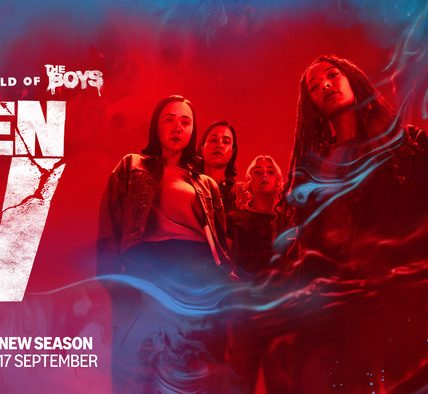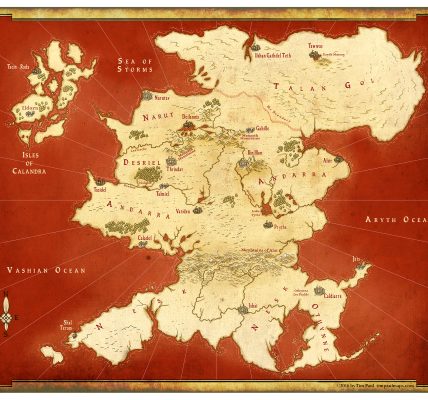The First Blade (2006) by Joe Abercrombie – Review
Satisfying Exploration of Suffering In A Gritty Fantasy World

We open to a massacre: Logen Nine Fingers—a famed warrior—runs for his life, dragging himself through the filth of the forest to escape monstrous Flatheads. It’s a brutal sprint for survival that takes him to the edge of a cliff, where death is an inch too far from the stream below.
Falling into that cold water, I’m as shocked as this lumbering Northman on impact – I understand in seconds. Joe Abercrombie isn’t looking to make it easy, and I love it. This gritty world of The First Law Series might be a little lacking in structure and a bit too sparse on action. But it’s mysterious, gritty, and real enough for me to immerse myself like never before.
- A Knight of the Seven Kingdoms – Ep. 1 – The Hedge Knight Review (2026) Less Magic, More LaughterGame of Thrones’ second spin-off show turns away from dragons and prophecies in favour of a grounded piece about duty, honour, and courage.
- Gen V Season 2 – Episode 1-3 Review – Back and Better Than Ever Gen V season 2 takes us right back into The Boys’ world, full of its dismemberment, over-the-top graphic super-power sex, and slapstick comedy.
The Law’s of Magic Are Being Broken, A Band of Rogues Must Save the World
Sand dan Glokta is a crippled veteran of the Union’s War with the Gurkish Empire. Every day is a waking nightmare, one in which he exists only to dole out torture for his masters in the Inquisition. As an inquisitor, Glokta must use his sharp mind and skills honed during his suffering in Gurkish prison to unravel a conspiracy of traitors.
Jezal Dan Luther is an officer of noble birth in His Majesty’s army. Serving as a lieutenant under war hero and commoner turned Major Collem West, Jezal must prepare for the Contest. This bout of Champions will see young warriors test their skills with the blade against the finest in the Union. Jezal is arrogant, young, and brash, and he has never been in love—until West’s young sister from Angland arrives in the Capital and turns his world upside down.
Logen Nine-Fingers is a warrior of great renown. Once part of a band that battled against the new king of the North, Bethod, Logen has been tried and tested many times, and each time he prevails—he lives while others die. While his past may be a burden, his future could be something greater. Summoned by The First of the Maigi, Bayez, the warrior and the wizard find their paths taking them to the very heart of the stirring darkness in the world. There are more foul plots afoot than roving bands of Flatheads.
An ancient evil stirs. Yet, what can these strangers do? The Magi has a plan, and no one is going to like it. There are no adventures outside these doors, and the honour of men has long since vanished. But the world doesn’t need good people; it needs warriors.
A Brutal World With Brutal Characters
“Kill your darlings” is a phrase heard often when discussing literature. Abercrombie hasn’t done that yet. Because, quite frankly, all his characters are incredibly dislikeable—in the best way. Gokta is a bloodthirsty masochist who enjoys putting others under the whip, Logen is a mass murderer, and Jezal is a spoiled prick. Even Bayez isn’t very likable.
Abercrombie’s characters do not feel like heroes; they feel like people—layered and complex, with their own flaws and traumas. Their experiences have shaped them, and Abercrombie has made that shaping feel natural.
Redemption, fame, vengeance, bitterness – these are the motivations that drive our cast of ‘heroes’. Not a single one of them could be described as pure of heart; they each carry some form of darkness. And that’s something that wins me over. Often in literature, you’ll find characters going down paths and being presented with terrible opportunities. It’s not often that you see these characters accepting these choices and justifying them.
When Gokta decides to interrogate a prisoner or belittle a union soldier, in his twisted mind he’s justified. When Jezal has the arrogance to say he doesn’t need to train so hard and that he’s better than others of less noble birth, he means it and he doesn’t change. Not quickly. We meet these characters well into their lives, where they’ve established themselves and defined their own morality. When change does come, it’s slow, it’s difficult, and it’s painful.
It’s authentic. Not a single act that changes a man, but the first dominos falling in a long sequence.
Good Things For Those Who Wait
I’ve read plenty of novels that begin with a sense of urgency: a quest to a far-off land that needs to happen immediately, a mission to a distant world where hope depends on how long it takes to reach the destination, and a chosen warrior who must learn to master secret magic in time to face the dark lord. These stories move at a brisk pace, barely stopping to allow us to meet our characters and understand their world.
Abercrombie takes us to the time before the quest, the secret chapter before the wizard goes on the road. In “The Blade Itself,” we do not find ourselves at the beginning of the story, but in the time before the history of this world is written. It might seem counterintuitive to spend so much time with characters doing so little.
And yet now, as I inch my way into the opening chapters of Before They Were Hanged, I understand. I understand what makes these characters unique. I understand the limiting and plain minds of battle-hardy Northmen, who view cities as clustered, chaotic cacophonies of sound and sight. I understand the pressures and expectations of a soldier of the Union, the power of family, blood, and station, and the coddling comfort of civilisation. I know the feral savagery of a hunter who sees kindness as a foreign entity, recognizing no worthy purpose but the pursuit of revenge.
Abercrombie has taken us backstage before the play and allowed us to gaze into the eyes of our actors, knowing them so fully that by the time I reach the last page, I am ready for the next part of the story.
I don’t need to know what motivates these characters because I’ve already been told—the blank pages that are usually filled in during the journey have been completely filled. I know the characters; now I wait for the story.
A Strange World Still Alien
If there’s anything that doesn’t work about this technique, it’s that Abercrombie focuses so heavily on developing the characters that the world remains a bit of a mystery. It’s an intriguing mystery, but also frustrating. There are times when I feel uncertain about the mythology behind this world.
Much of the information is provided across gaps of dozens of chapters. For example, Flatheads are introduced in the prologue but not explained until well into the later half of the novel. Yet, I cannot imagine what these creatures are or what they look like, whether they are human or something else.
Magic is not really explained until you’ve made a good dent in the book, and by then, it’s been used several times. It’s also unclear exactly who the magic users are. Names such as Juvens and Kanedias are given but are not really given the context required to understand their significance, and there is significance—it’s only gleamed at the end of the book.
Abercrombie even admits in the 10th edition of Before They Are Hanged that the structure of his debut novel isn’t perfect, and I agree. It’s not enough to ruin the experience, however; it just makes it a little more difficult to stay actively invested (not every chapter is a winner).
Conclusion
The Blade Itself tells the wonderful story of truly horrific, horrifying, and horrible people in a world of horrors that forces them to struggle horrendously—there’s a real grit to the story that makes the world feel more like Grimdark Fantasy. While its structure and worldbuilding aren’t perfect, the shape is close enough to the mold that these small imperfections can go mostly unnoticed.
I rate this 8.8 out of 10.






